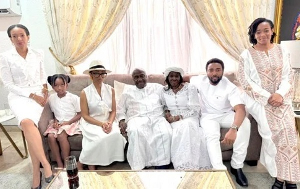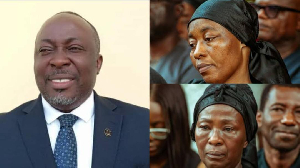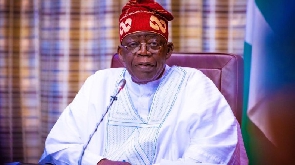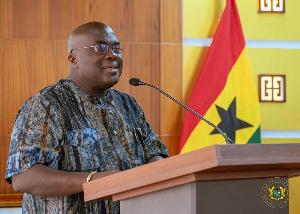.....the the Ghanaian society.
While the various Presidents in this 4th Republic have declared openly their determination to fight corruption, they have failed to provide the practical support to institutions and people entrusted with the anti-corruption drive. What some of us have feared all these years appears to be manifesting. We have been apprehensive that although the various governments of this country have indulged in loud but empty rhetoric about fighting corruption, they are least prepared to do so practically. Either by design or a willful determination to subvert their own measures to fight corruption, these governments have done one thing in one breath against corruption only to undo that very thing in the same breath.
It was intensified under former president Kufuor and late former president Mills. Corruption is rife in Ghana and Ghana’s position on the global corruption index has not changed in any positive way because the government lacks what it takes to stem corruption. There is no hope for us if what has been happening doesn’t abate.
I have realize, if one bold individual stands up to lead the fight against corruption, his life is endangered. In the past,a justice of the High Court, Mr Justice Iddrisu Mahamadu says his life is in danger following the trial and conviction of six policemen and four civilians for robbery over which he presided. The threat to Justice Mahamadu’s life was reported to then Inspector-General of Police, Mr. Paul Tawiah Quaye, by the Chief Justice, Mrs. Justice Georgina Wood. In her report, the Chief Justice told the IGP that following the conviction of the six policemen and four civilians by Justice Mahamadu, he has received numerous threats to his life. Soon after their conviction, some of their family members wailed and vented their anger on the judge and some journalists outside the courtroom. They openly cursed and rained unprintable insults on the trial judge, who was escorted to his vehicle by court clerks and policemen.
When former president Kufuor led government took action to prosecute NDC functionaries it accused of “causing financial loss to the state,” the NDC rose up in arms. Politicized as issues might be, there was evidence that corrupt practices took place and that the individuals being tried were actively involved in it.
At the turn of the political table, the late former president Mills government began taking action against the NPP functionaries whose corrupt acts (e.g., Jake snatching government property) were evident; but what did we see? The NPP elements also rose up in arms, threatening hell-fire and brimstone. As if cowered into submission by such threats, the Mills government budged, creating a bad-blood relationship between itself and the rank and file of the NDC who think that the NPP elements were corrupt and should be punished.
By rising to the defense of those perceived as corrupt, their sympathizers hinder the anti-corruption drive. Can the fight against corruption really succeed if people rush to defend those known for being corrupt? How do we perceive or conceive corruption as a moral canker or socio-economic and political vice that we must fight to the hilt? Corruption is the root cause of the high crime wave that our country faces.
By its very nature, corruption doesn’t mean only bribe-taking, as most people wrongly conclude. Any act that goes contrary to the norm qualifies as corruption. Tribalism and nepotism in the choice and appointment of office holders, recruitment into the security services, or any other institution. Favouritism in the promotion or laying off of workers (especially under the policy of redeployment or retrenchment); Award of contracts (whether going through appropriate layers of bidding or not) to preferred candidates and ripping off profits in the form of kickbacks; Sidestepping official procedures for managing offices and national assignments (e.g., procurement—over-invoicing or under-invoicing for personal gains); Creating conditions conducive to the greasing of palms (e.g., in the nomination and choice of candidates for enstoolment as chiefs/queenmothers; sale of land; etc.); and Giving or accepting gifts (e.g., foodstuffs, money, tangible or intangible items, etc.) before performing functions within one’s purview (doing in office what one was hired to do and be paid for).
The Imams and pastors are known for their crusading sermons against corruption; but how many of them haven’t been taken to task for abusing their office, preaching against immorality but indulging in it? Judges have been accused of bribe-taking; personnel of the security services (Customs and Immigration officers) have done corrupt things; the politicians are known for indulging in corrupt practices (wife-snatching, visa racketeering, abuse of office, etc.); civil servants have institutionalized measures to collect bribes from people calling for processing of their documents; the police collect bribe in the open; school administrators collect bribe before they admit students; many more. Who will claim not to be part of this racket of corruption in Ghana? Communistic as our Ghanaian body politic is, one accepts the fact that the milk of human kindness flows through our human streams. Thus, it is not strange for someone to know another person in authority somewhere who is capable of helping a distressed person in one way or the other. That’s our natural bent. But when this natural bent is overstretched so as to become problematic, we must pause to reconsider it and make amends.
We have reached a stage where such a drastic reconsideration must be made if we want to fight successfully corruption and its attendant negative consequences. Recourse to the laws that prohibit corruption is our first step. But where do we start from? There appears to be confusion in terms of what constitutes a “gift,” on the one hand, and what amounts to “corruption” (bribery), on the other hand.
The constitution explicitly calls for the declaration of assets by the President and government officials at specific times. But what have we had so far? How will we know their standing at the time they enter office so as not to accuse them of corruption when their assets begin piling up? Other instances of corruption have come to notice, but the government doesn’t seem to care a rap about such public apprehensions. Allegations of corruption deserve to be followed up and investigated for us to know what the truth is. The then former MP for Asikuma-Odoben-Brakwa, P.C. Ofori-Appiah, has cried himself hoarse on bribery allegations against then Kufuor-led NPP government until this era of the NDC. His fellow NPP functionaries derided him as “mad” and pooh-poohed his allegations. Even if he is “mad,” as his own people wants us then to believe,does it mean that his allegations too are “mad”? What has anybody done to follow the numerous leads that he has provided? Instead of doing so, the then government was frozen and turns attention elsewhere. How can we truly say that we are interested in fighting corruption if we do not regard allegations against public officials as worth our bother? The point is that such allegations create credibility problems and deflate confidence in the fight against corruption.
Institutions that have been established to fight corruption have been systematically starved of funds and their personnel brow-beaten into fearing for the security of their jobs if they dare perform the very functions for which they were hired and paid monthly. In effect, our governments have adroitly turned those institutions into paper tigers while massaging public feelings that they are fighting corruption.
The EOCO should by now have been well-established and supported to perform its legitimate functions. Instead, it appears to be falling prey to the vicious political game that the party in power lures it into. The truth is that the EOCO is impotent. As for the CHRAJ, it is doomed already. The Criminal Investigations Department of the Police Service is also mired in corrupt practices by its personnel and has lost public confidence. Under former president Kufuor, the loss of quantities of cocaine from the custody of the Police and several other corrupt acts by the police personnel themselves over the years have completely dented the image of the Police Service. It cannot purge itself of such a sordid image nor is it clear what it can do to repair it. If the people who are recruited to fight corruption are themselves corrupt, where is the guarantee that the fight against corruption will ever succeed?
We have reached a stage in the handling of national affairs to know that we cannot make any progress if we do not allow the laws of the land to function effectively. We can’t help but turn to the United States for examples. In the U.S., the law doesn’t only bark; it bites very deep. It doesn’t matter who is involved; the law will not spare anybody who falls foul of it. That’s why the US citizens fear the law. They know that they will not be spared.
In our case, it is the reverse because the very people who are entrusted with enacting, interpreting, or enforcing the law are the first to flout it with impunity. Nobody seems prepared to do what will instill “the fear of the law” in anybody. There are grandiose designs on paper to fight corruption, which every government functionary openly refers to, but does not fear or comply with. Human and infallible, though we are, there is hope that if we do the right thing, we will shame the devil. Are we prepared to do the right thing to stem corruption and purge ourselves of greed and filth?
President John Mahama needs to know that his government cannot escape blame if it does nothing concrete to stem corruption. It is the institutions of state that must be strengthened to make corruption unattractive, not one or two individuals projecting themselves as such. When our institutions are strong enough to stem corruption, the individuals will not be tempted to indulge in it. As U.S President Obama has already cautioned us, the time has come for us to break away from the mentality of “strongmen” to that of strong institutions of state.That is how countries brave the storm and move forward. Ghana must move forward too. I challenge President John Mahama to make the difference in the fight against corruption.
Ibrahim Hardi 0208235615
Email;bigkolaaya@yahoo.com
Opinions of Wednesday, 6 November 2013
Columnist: Hardi, Ibrahim














